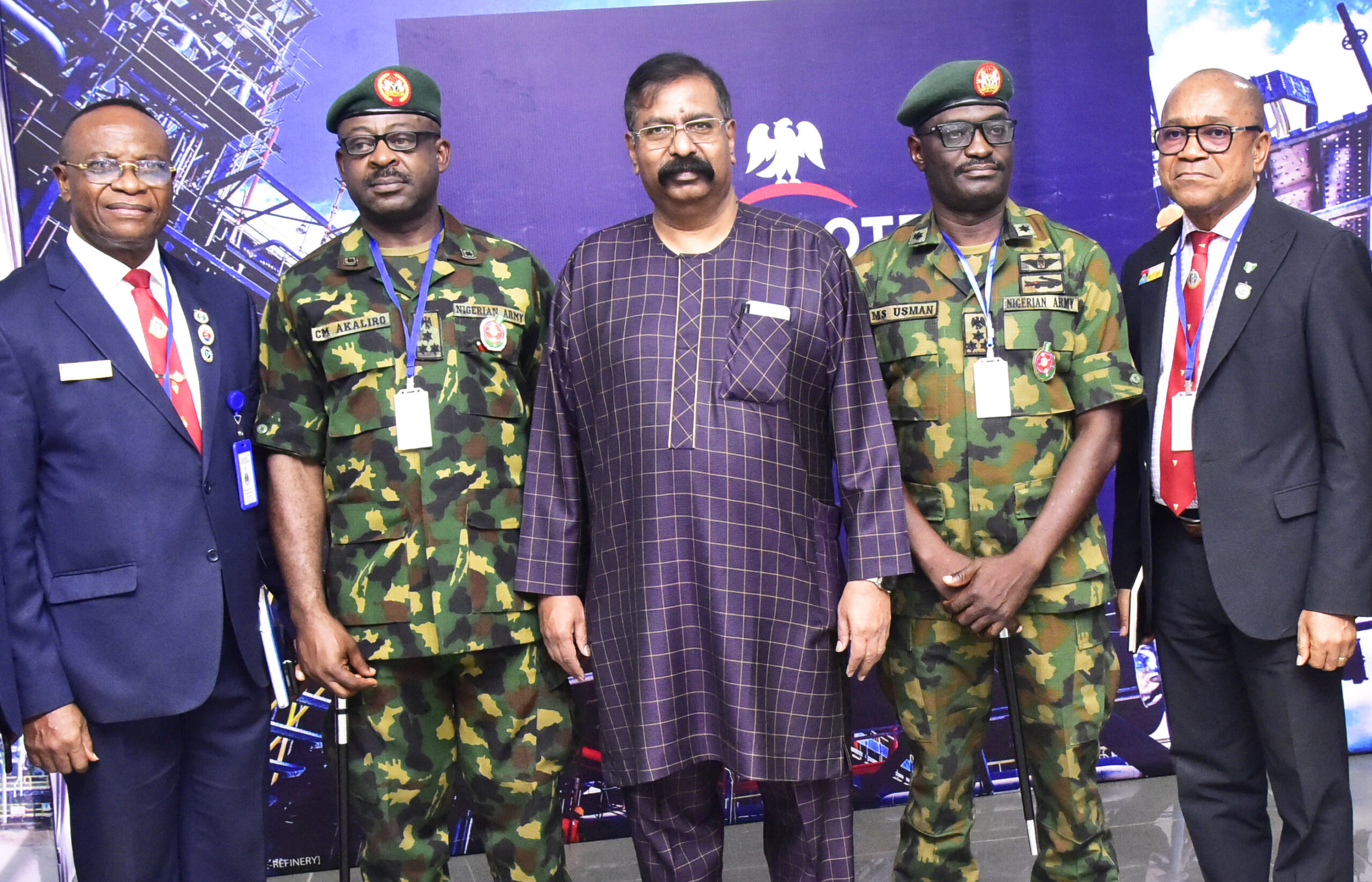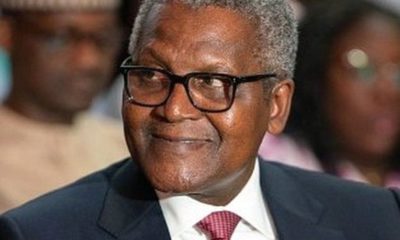Business
Why Investors Savour Dangote Sugar Equities

Discerning investors who kept faith with Dangote Sugar’s equities at the Nigerian Stock Exchange (NGX) for H1, 2023 are savouring the strong earnings, which has resulted into a 36.21 percent capital gain for the period.
Biztellers gathered that over a 42-month period, between 2020 and June 31, 2023, investors who kept faith with the stock found their wealth to have grown by a 48.85 percent capital appreciation.
According to Managing Director, APT Securities and Funds Limited Kasimu Garba Kurfi, the capital growth is traceable to the 2022 full year and Q1, 2023 results.
In its 2022 financial year, the company announced a 46.02 percent increase in revenue to N403.24 billion from N276.05 billion.
Profit before tax grew 137.72 percent to N82.30 billion from N34.02 billion. Profit after tax increased 148.25 percent to N54.74 billion from N22.05 billion.
In the same period, the company paid tax of N27.56 billion, up from N11.96 billion in 2021.
In addition to posting good figures, Dangote Sugar also delivers good dividends which lures discerning investors, including bargain hunters to take positions.
Some enter the stocks, months before dividend payment in anticipation of cash reward, and exit later to take advantage of price appreciation.
In 2022, the company announced N12,146,874 dividends to its shareholders.
The uptrend in profit came amid rising costs as the cost of sales rose from N225.85 billion in 2021 to N311.28 billion in 2022. The increase in cost is due to currency depreciation, a rise in the cost of raw material importation, an uptick in distribution cost, a rise in diesel price and tax expenses.
Biztellers gathered that the company, deployed efficient cost management strategies to tame spiraling costs. Efforts in this direction saw it successfully cut down selling and distribution expenses to N741 billion from N906 billion in 2021.
In the same vein, finance cost fell to N3.42 billion from N5.21 billion in the same period.
Fund managers expect Dangote Sugar to maintain its stellar performance for the rest of 2023.
The optimism is on the back of the impressive Q1, 2023 result and price gain in H1, 2023. In Q1, 2023, revenue rose 8.23 percent from N94.44 billion in Q1, 2022 to N102.22 billion. Profit before tax grew to N18.33 billion from N13.60 billion.
This is in spite of an increase in finance cost to N8.05 billion from N3.50 billion. The result confirmed the effectiveness of the company’s cost containment strategies as selling and distribution expense declined to N174.56 billion from N260.81 billion in Q1, 2022. The cost of sale rose only marginally from N74.98 billion in Q1, 2022 to N76.47 billion in Q1, 2023.
Biztellers reports that Dangote Sugar’s backward integration policy is building further investor confidence in the company’s ability to successfully contain cost of raw sugar importation, and grow bottomline and returns.
It was gathered that the company is focused on its 10-year sugar development plan. By the sugar development policy, Dangote Sugar aims to produce 1.5 million metric tonnes per annum from locally grown sugarcane.
In pursuant of the plan, the company has committed enormous resources to its Dangote Sugar Taraba Limited, Dangote Sugar Nassarawa Limited and Dangote Sugar Adamawa Limited in which it targets expanding sugar refining capacity from 3,000 tonnes per annum to 9,000 metric tonnes.
Biztellers investigations show that as part of the backward integration project, Dangote Sugar is poised to grow its sugar plantation from a land area of 8,700 hectares in 2022 to about 24,200 hectares in 2030.
To assure shareholders of its culture of transparency, the company’s Board of Directors has put in place a strong corporate governance culture.
Business
Savannah Energy Provides Unaudited FY 2024 Trading Updates

Savannah Energy has shared a trading update on its Nigerian operations and other markets in Africa, including up-to-date cash collections in its Nigerian business.
According to the update, made available on Thursday in Lagos, its gross production in Nigeria averaged 23.1 Kboepd for FY 2024, broadly in line with the prior year’s 23.6 Kboepd, of which 88% was gas (FY 2023: 91%).
On the update, CEO of Savannah Energy, Andrew Knott, said, “I am pleased to provide a FY trading update which demonstrates the continued progress we have made in 2024, a year which saw the highest level of cash collections ever recorded by our Nigerian business. 2025 is expected to be an exciting year for our Company: we have a large planned operational programme in Nigeria which is anticipated to enhance both our oil and gas production levels and capacity; we intend to progress our R3 East oil development project in Niger; we continue to pursue key acquisitions in the upstream oil and gas space; and we continue to seek to build our power business.
“Fundamentally, Savannah remains unequivocally an “AND” company, seeking to deliver strong performance both for the short AND long term across multiple fronts, and pursuing growth opportunities in both the hydrocarbon AND power sectors.”
The update It also shows that it generated a Total Income of US$393.6 million in 2024, compared to FY 2023’s US$289.8 million. This consists of Total Revenues of US$258.7 million and Other operating income of US$134.9 million.
The report also shows that Savannah’s FY 2024 Total Revenues were ahead of the previously issued financial guidance of greater than US$245 million, while FY 2024 financial guidance is reiterated for Operating expenses plus administrative expenses at ‘up to US$75 million’. The company expects its FY 2024 capital expenditure to come in lower than planned (previously guided at ‘up to US$50 million’) due to the phasing of spend.
ALSO READ: CSR: Dangote Awards Scholarships To 473 Students
According to the update, Savannah’s cash collections in 2024 amounted to US$248.5 million, a slight increase from the US$206 million it received in 2023. The report further shows that its cash balances as at 31 December 2024 stood at US$32.6 million, compared to the 31 December 2023 figure of US$107.0 million.
The report shows that the company’s midstream subsidiary, Accugas Limited, had as at 31 December 2024 drawn down on its NGN332 billion of the NGN Transitional Facility, with the resulting funds being converted to US$, which, along with cash held, was used to partially prepay the existing Accugas US$ Facility, leaving a balance as at 31 December 2024 of approximately US$212.3 million.
The report also provided new updates on Accugas’ US$45 million Uquo Central Processing Facility (“Uquo CPF”) compression project in Nigeria, noting that its commissioning which will enable the expansion of gas production in the medium term is well underway.
The report highlighted the progress being made in the procurement process of long lead equipment in Nigeria for a potential two-well drilling campaign on the Uquo Field in H2 2025, with an additional gas development well expected to add up to 80 MMscfpd of supplemental production capacity and a potential exploration well targeting an Unrisked Gross gas initially in place (“GIIP”) of 154 Bscf (25.7 MMboe) of incremental gas resources.
The update shows that progress is also being made in the planned Savannah acquisition of Sinopec International Petroleum Exploration and Production Company Nigeria Limited, whose principal asset is a 49% non-operated interest in the Stubb Creek oil and gas field (“Stubb Creek”), with regulatory approval and completion being targeted in Q1 2025. Following the completion of the acquisition, Savannah intends to commence an expansion programme which is anticipated to increase Stubb Creek gross production from an average of 2.7 Kbopd in 2024 to approximately 4.7 Kbopd.
In Niger, Savannah continues to seek to progress its 35 MMstb (Gross 2C Resources) R3 East oil development in South-East Niger, while it continues to push for a potential alternative transaction structure to acquire a material stake in producing oil and gas assets in South Sudan as previously announced on 20 December 2024.
On the renewable energy front, the update shows that Savannah has up to 696 MW of renewable energy projects currently in motion, including the up to 250 MW Parc Eolien de la Tarka wind farm project in Niger and the up to 95 MW Bini a Warak hybrid hydroelectric and solar project in Cameroon. A firm believer in Africa’s transition to renewable energy, Savannah continues to target a portfolio of up to 2 GW+ of power projects in motion by the end of 2026.
Business
Nigeria Can Achieve 5.5% GDP Growth – NESG
The Nigerian Economic Summit Group (NESG) has projected that the country has the potential to achieve a 5.5% growth in Gross Domestic Product (GDP) if critical policy reforms are sustained.
This was disclosed on Thursday during the launch of the NESG’s 2025 Macroeconomic Outlook report.
Speaking at the event, the Chief Economist and Director of Research & Development at NESG, Dr. Olusegun Omisakin, highlighted the need for more efficient policy implementation to unlock Nigeria’s economic potential.
READ MORE: Davido Is Richer Than His Billionaire Father – Ibrahim Chatta Claims
“We believe at the optimal level, if we embark on more efficient policy reforms, the Nigerian economy has the potential, the GDP to end up at 5.5 per cent, and we believe that this is achievable,” Omisakin stated.
More to follow……….
Business
CBN Approves Release Of Nigerian FX Code
The Central Bank of Nigeria (CBN) has announced the release of the Nigerian Foreign Exchange (FX) Code, a set of guidelines designed to promote ethical conduct among authorized dealers in the country’s FX market.
In a statement, the apex bank disclosed that the official launch of the Code would take place on Tuesday, January 28, 2025, at the CBN Head Office Auditorium in Abuja.
READ MORE: Dangote Denies Culpability In Pumping Up Petrol Price
“The Central Bank of Nigeria has approved the release of the Nigerian Foreign Exchange (FX) Code as a guideline to the banking industry to promote the ethical conduct of authorised dealers in the Nigerian Foreign Exchange Market,” the statement read.
The introduction of the FX Code is expected to enhance transparency, accountability, and professionalism within Nigeria’s foreign exchange ecosystem, aligning it with global best practices.
The event is anticipated to attract key stakeholders in the financial and banking sectors, as well as representatives from authorized FX-dealing institutions across the country.



















